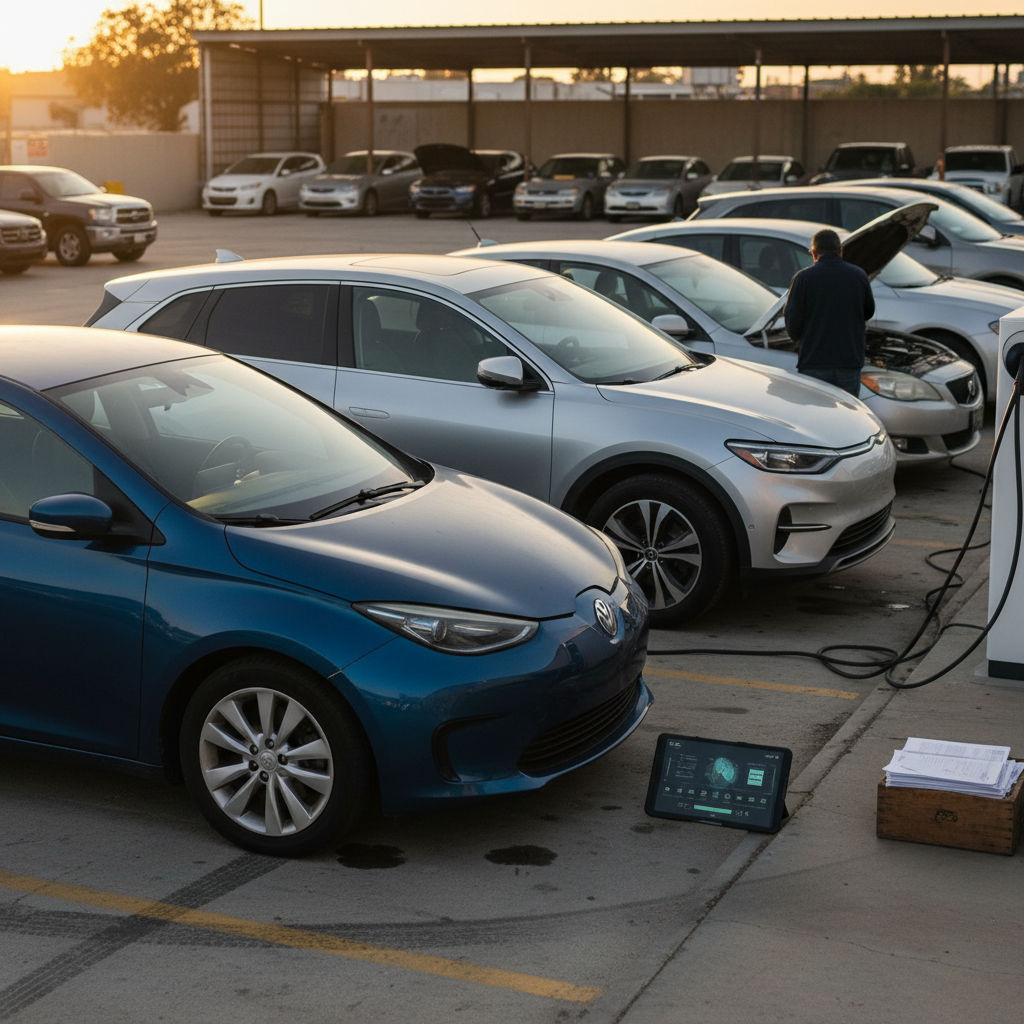If you ask ten people what the best electric vehicle is, you’ll get ten different answers, and they’ll all be a little bit right. In 2025 there is no single winner; instead, there are clear standouts for different budgets, ranges, and lifestyles. This guide pulls together the latest rankings, range data, and market reality to help you decide which EV is “best” for you, especially if you’re considering a used model.
Why this guide focuses heavily on used EVs
How to think about the “best” electric vehicle in 2025
Before you chase a list of top‑10 charts, it helps to get clear on what “best” actually means for your situation. The Lucid Air Grand Touring may offer over 500 miles of EPA‑rated range and stunning luxury, but that doesn’t make it the best choice for a commuter trying to keep payments under $400 a month. Conversely, the most affordable Chevrolet Equinox EV might be perfect on paper, but not if you regularly tow a trailer or need three rows.
- Best for range: Prioritize large battery packs, efficient aerodynamics, and fast‑charging capability.
- Best for value: Look at total cost of ownership, purchase price, incentives, energy costs, and resale value.
- Best for families: Space, safety ratings, rear‑seat comfort, and fast DC charging are more important than 0–60 times.
- Best for long commutes: Efficiency (mi/kWh), driver‑assist tech, and seats you can live with every day.
- Best for trucks & towing: Torque, payload/tow ratings, and how range drops when you’re hauling.
Start with your use case, not a model name
Market snapshot: Why EVs are having a moment, especially used ones
EV adoption and choice in 2025
For shoppers, this means two things: first, there’s now an EV in almost every segment; second, the early adopter premium is fading. As new EV growth slows a bit and incentives get reshuffled, prices for 2–3‑year‑old EVs are correcting downward, especially for Tesla Model 3 and Model Y, Hyundai Ioniq 5, Kia EV6, and Ford Mustang Mach‑E. The key is understanding which of those are genuinely good long‑term bets, and which ones you should avoid.
Quick picks: Best electric vehicles by driver type
Best EVs of 2025 by use case
If you don’t want to read the whole guide, start here, then dive into the sections that match your short list.
Best all‑around electric car
Hyundai Ioniq 6
Sleek aero sedan with excellent efficiency, strong safety tech, and a comfortable ride. Frequently named Best Electric Car in 2025 awards thanks to its balance of price, range, and refinement.
Best electric SUV
Hyundai Ioniq 5
Spacious, stylish crossover with ultra‑fast charging and a roomy interior. It’s been repeatedly crowned Best Electric SUV and has become a rock‑solid choice on the used market.
Best electric truck
Ford F‑150 Lightning
Retains the familiar F‑150 feel, adds silent torque and home‑backup capability. Still the reference electric truck for most Americans, especially in Lariat and XLT trims.
Best long‑range luxury EV
Lucid Air
With versions topping 500 miles of EPA range and a high‑end interior, the Lucid Air sets the benchmark if you want maximum range and luxury, and are willing to pay for it.
Best affordable long‑range EV
Chevrolet Equinox EV (new) or Chevrolet Bolt EUV (used)
The Equinox EV delivers ~320 miles of range at a mainstream price, while a used Bolt EUV offers unbeatable dollars‑per‑mile of range for budget buyers.
Best three‑row family EV
Kia EV9
A genuine three‑row SUV with strong charging speeds and a comfortable cabin. On the used market, early price drops make it one of the smarter family EV buys.
Awards are a starting point, not a verdict
Best electric cars of 2025: Sedans and hatchbacks
Sedans and hatchbacks are still the efficiency champs of the EV world. Their lower ride height and sleeker aerodynamics mean more miles of range for every kWh of battery, and often lower prices than SUVs and trucks built on the same platform.
Standout electric cars in 2025
These models regularly appear near the top of independent rankings for range, value, or driving experience. Stats are for typical mid‑range trims.
| Model | Approx. EPA Range (mi) | Segment | Why it’s a “best EV” contender |
|---|---|---|---|
| Hyundai Ioniq 6 | 305 | Midsize sedan | Highly efficient, strong safety tech, fast charging, and competitive pricing make it a benchmark electric sedan. |
| Tesla Model 3 (RWD/Long Range) | 272–341 | Compact sedan | Excellent charging network access, strong efficiency, and a huge used inventory at falling prices. |
| Lucid Air | 410–516+ | Luxury sedan | Industry‑leading range in upper trims, high‑voltage architecture, and true luxury refinement. |
| BMW i4 | 256–307 | Sport sedan | Blends classic 3‑Series‑like dynamics with an EV powertrain, making it a great driver’s car. |
| Chevrolet Bolt EUV (used) | 247 | Compact hatch | Outstanding value on the used market; simple, efficient transportation with good range for the price. |
Use this table as a short list; availability and exact specs vary by model year and trim.
Don’t obsess over max range numbers
Best electric SUVs and crossovers in 2025

Crossovers and SUVs are now the heart of the EV market. They’re what most Americans want to drive, which is why models like the Hyundai Ioniq 5, Kia EV6, Tesla Model Y, and Chevrolet Equinox EV dominate both awards lists and sales charts.
Top electric SUVs and crossovers to consider
Think of this as a menu: you probably don’t need all‑wheel‑drive performance <em>and</em> three rows <em>and</em> 300+ miles of range.
Hyundai Ioniq 5
Why it’s great
- Repeatedly named Best Electric SUV thanks to its combination of design, comfort, and charging speed.
- Spacious, lounge‑like interior with sliding rear seats and a long wheelbase.
- On 800V architecture trims, can charge from 10–80% in around 18–20 minutes under ideal conditions.
Kia EV6
Why it’s great
- Shares a platform with the Ioniq 5 but skews sportier, with a lower roofline and more aggressive handling.
- Good balance of range, charging speed, and price, especially on the used market.
- GT trims offer serious performance without supercar‑level prices.
Tesla Model Y
Why it’s great
- Still one of the most efficient and practical electric crossovers for families.
- Access to Tesla’s Supercharger network, including an expanding universe of NACS‑compatible non‑Tesla chargers, makes road trips easier.
- Huge used inventory gives you leverage on price, especially for 2021–2023 builds.
Kia EV9
Why it’s great
- One of the first genuinely good three‑row EVs, with adult‑friendly second and third rows.
- Fast DC charging and a calm, well‑appointed interior make it a road‑trip hero.
- Early depreciation has turned it into a compelling used‑EV value for families.
Watch curb weight and tire costs
Best electric trucks in 2025
Electric pickups are still a niche compared with gas trucks, but they’re maturing quickly. The best ones blend the utility and familiarity truck buyers expect with instant torque and the ability to power tools, or even your home.
Top electric truck picks
If you tow or haul heavy loads, focus less on peak range numbers and more on how the truck behaves under real work.
Ford F‑150 Lightning
Best overall electric truck
- Consistently recognized as the benchmark electric pickup.
- Feels like an F‑150 you already know, just quieter and quicker.
- Pro Power Onboard turns the truck into a rolling generator.
Rivian R1T
Best adventure truck
- Max battery options push EPA range above 400 miles in some configurations.
- Excellent off‑road capability and clever storage, like the gear tunnel.
- Appeals more to outdoor‑adventure buyers than jobsite fleets.
Chevrolet Silverado EV & others
Worth watching
- GM’s Ultium‑based trucks and upcoming Ram EVs are closing the gap.
- For now, they’re still relatively expensive and less common on the used market.
Range drops fast when towing
Best value used electric vehicles

If you’re hunting for the best electric vehicle from a value perspective, used is where things get interesting. Depreciation hits EVs hard in the first few years, but batteries are aging better than many skeptics predicted, especially in cars with robust thermal management and conservative fast‑charging curves.
Used EVs that frequently top “best of” lists
Exact picks will vary by mileage, condition, and software version, but these nameplates are consistently strong on the used market.
Hyundai Ioniq 5
Combines modern tech with a roomy interior and fast charging. 2022–2023 models often undercut comparable new EVs by five figures while delivering similar real‑world range.
Tesla Model 3
Huge supply, improving build quality over time, and access to the Supercharger network make it a compelling used buy, especially if you verify battery health and tire condition.
Hyundai Kona Electric & Chevy Bolt EUV
Smaller, simpler EVs that shine on value and efficiency. They’re not glamorous, but for city driving and commuting they offer a lot of range per dollar.
Rivian R1T/R1S
Early models have seen meaningful price softening while still offering unique adventure‑oriented capability and frequent over‑the‑air improvements.
Kia EV9
A standout three‑row EV that’s already seeing used discounts. Great choice if you need minivan‑like practicality without driving a minivan.
Porsche Taycan (later years)
Earlier Taycans were range‑limited for the price, but battery and software improvements have made later years more compelling for enthusiasts willing to trade efficiency for driving joy.
Why battery reports matter more than trim levels
Specs that actually matter when choosing an EV
1. Battery size and efficiency
Battery capacity (kWh) tells you how big the energy tank is. Efficiency, usually expressed as miles per kWh or MPGe, tells you how far that tank gets you.
- A 77 kWh battery at 3.5 mi/kWh → ~270 miles of real‑world range.
- A 118 kWh battery at 3.0 mi/kWh → ~350 miles, but heavier and more expensive.
2. Charging speed
Peak kW numbers on marketing slides don’t tell the whole story. What matters is the charging curve, how long the car sustains high power.
- Look for 10–80% fast‑charge times, not just peak kW.
- 800V‑class cars (Ioniq 5/6, EV6, EV9, some luxury models) generally sustain higher power longer.
3. Onboard charger (AC charging)
This determines how fast you refill overnight on Level 2 (240V). Many EVs offer 11 kW onboard chargers; some go to 19.2 kW.
- If you can install a 40–48 amp Level 2 charger at home, an 11 kW onboard charger is usually fine.
- High‑power onboard chargers mainly help fleets or drivers who frequently need fast turnarounds on AC.
4. Driver‑assist and software
EVs are rolling computers. Over‑the‑air (OTA) updates can materially change range, charging behavior, and driver‑assist performance over time.
- Check which features are included vs. subscription‑based.
- On used cars, verify that important recalls and software updates have been applied.
Don’t ignore boring specs
Battery health and range in the real world
Battery packs are the most expensive component in an EV, and the main reason many shoppers get nervous about buying used. The good news is that modern liquid‑cooled packs from mainstream brands are aging more gracefully than early pessimists expected. The bad news is that abuse still matters: lots of hot‑climate fast charging and frequent 0–100% swings can degrade a pack faster.
Used EV battery health checklist
1. Look for a battery health report, not just a guess
A proper diagnostic will estimate remaining capacity versus original, flag cell imbalances, and show fast‑charge vs. AC‑charge patterns. Recharged’s Score Report is built around this kind of data.
2. Consider climate and usage history
All else equal, EVs that lived in very hot regions and did lots of DC fast charging will show more degradation than those that mostly trickle‑charged in temperate climates.
3. Check warranty status and coverage
Most EVs carry separate battery warranties, often 8 years or around 100,000 miles for a guaranteed minimum capacity threshold. A car still under battery warranty can be a safer bet.
4. Understand realistic range
Ask the seller, or check owner forums, about typical highway range at 70 mph and in winter. EPA numbers are a baseline, not a guarantee.
Don’t treat the pack like a phone battery
Financing, incentives, and total cost of ownership
The “best electric vehicle” is often the one that quietly wins on total cost of ownership rather than the one that looks most impressive in a specs table. Lower fuel and maintenance costs can offset higher sticker prices, especially if you stack the right incentives and financing.
Incentives and tax credits
Federal, state, and utility‑level incentives change frequently. Many now favor vehicles built in North America or under specific price caps.
- New EVs may qualify for point‑of‑sale credits that reduce the price on the spot.
- Some used EVs also qualify for federal tax credits up to a capped amount, subject to income and price limits.
- Utilities often quietly offer rebates for home charger installation.
Financing and ownership costs
Look beyond the monthly payment:
- Factor in home‑charging installation (if needed) and typical electricity rates versus gas.
- Get insurance quotes, performance EVs can be pricey to insure.
- Budget for tires, especially on heavy, powerful models.
Recharged can help you line up EV‑friendly financing and estimate your total ownership costs before you commit.
Why used EVs can win on cost
How Recharged helps you pick the right EV
Sorting through dozens of “best electric vehicle” lists is one thing; buying a specific car with confidence is another. That’s where Recharged comes in. The platform is built from the ground up for used EVs, combining data‑driven battery diagnostics with a modern, transparent buying experience.
What you get when you shop used EVs with Recharged
Less guesswork, more signal.
Recharged Score Report
Every vehicle comes with a Recharged Score Report that includes verified battery health, charging behavior insights, and how the car is priced versus fair market value.
Fully digital buying experience
Browse vehicles, review reports, secure financing, and complete paperwork online. If you’re near Richmond, VA, you can also visit the Recharged Experience Center.
Trade‑in & delivery
Get an instant offer or consignment options for your current vehicle, then have your next EV delivered nationwide. EV‑specialist advisors can walk you through every step.
Expert help from EV specialists
FAQ: Choosing the best electric vehicle for you
Frequently asked questions about the best electric vehicles
Bottom line: The best electric vehicle is the one that fits your life
Lists of the “best electric vehicle” are useful, but they’re snapshots of a fast‑moving market and usually focused on new‑car awards. The right EV for you is the one whose battery, range, charging behavior, interior space, and total cost line up with the way you actually live. For some drivers, that’s a used Hyundai Ioniq 5 or Tesla Model 3 at a steep discount; for others, it’s a new Kia EV9 that finally replaces a thirsty three‑row SUV.
If you’re ready to move from research to reality, Recharged can help you compare specific used EVs with objective battery data, transparent pricing, and EV‑savvy support from first click to driveway delivery. That way, when you finally pick your “best electric vehicle,” it’s because the numbers, and the car, truly make sense for you.



